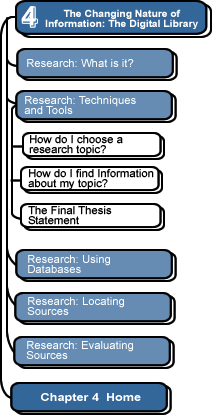

How
Do I Find Information About My Topic?
(continued)
General Knowledge to Particular Knowledge
The most common method of attacking a research problem is to get an overview and then drill down to specific information. An overview can be obtained by searching encyclopedias, handbooks, and other reference sources. This overview will identify key issues and persons, commonly used phrases, chronologies, and important authors. From there you can begin to pursue the elements important to your research.
Remember, at this point in the research process, you are getting an overview of the topic. You should not dive into systematic fact-gathering until you have a final thesis statement. However, record any facts, book titles, key phrases, and important people or ideas that might be useful later. The following investigation of the topic illustrates what could be done at this point in the research process.
General Area of Interest:How the U.S. increased its presence in Vietnam
- Examine articles in a reputable general encyclopedia, such as Encyclopedia Britannica.
- The library has many specialized subject encyclopedias in its reference collection. They can provide you with an overview of your topic as well as references to the best books and articles published on your topic. For example, the library owns Encyclopedia of the Vietnam War: a political, social, and military history.
- Examine authoritative websites that deal with the subject. For example, the Vietnam War Internet Project is worth a look at this stage of research.
- Examine scholarly monographs. For example, Edwin Moise's book Tonkin Gulf And The Escalation Of The Vietnam War should be skimmed for clues. Spend thirty minutes skimming chapters; examining the index for important people, places, or ideas; and looking through the bibliography for other book or article titles.
After spending an hour examining the previous documents, the following clues might be identified. These clues will lead you to other aspects of the topic and to other books and articles.
- Gulf of Tonkin - incident that seems to have started the escalation
- Robert McNamara - key player
- Henry Cabot Lodge, U.S. ambassador in Saigon - key player
- Quote: "U.S. officials had occasionally mentioned the possibility of major military pressures against North Vietnam as early as 1961, but it was in early 1964 that this possibility began to receive serious and widespread consideration." - important dates for frame of reference
- Quote: "A plan for escalation of the war leaked to the press in late February or early March. It called first for a blockade of Haiphong harbor, then raids against the North Vietnamese coast, and finally for bombing of strategic targets in North Vietnam, carried out by U.S. pilots under either the American or the South Vietnamese flag. Newsweek called this the Rostow Plan." - key phrase
- General Westmoreland - key player
- The Psychology of Escalation - interesting slant on the whole escalation theme
- Early in 1965, one of America's leading strategic thinkers, Herman Kahn, published a book entitled On Escalation. - might be useful
- "The top leaders of the Republican Party, including both Richard Nixon and Barry Goldwater (the party's nominees for president in 1960 and 1964, respectively) were less cautious in their statements. On April 16, Nixon strongly urged bombing North Vietnam." - Republicans were strongly behind the idea of escalation
![]()
![]()
These pages were
written by Glenn Remelts.
and edited by Jeffrey L. Nyhoff and Nancy Zylstra
©2005 Calvin University (formerly Calvin College), All Rights Reserved
If you encounter technical errors, contact computing@calvin.edu.